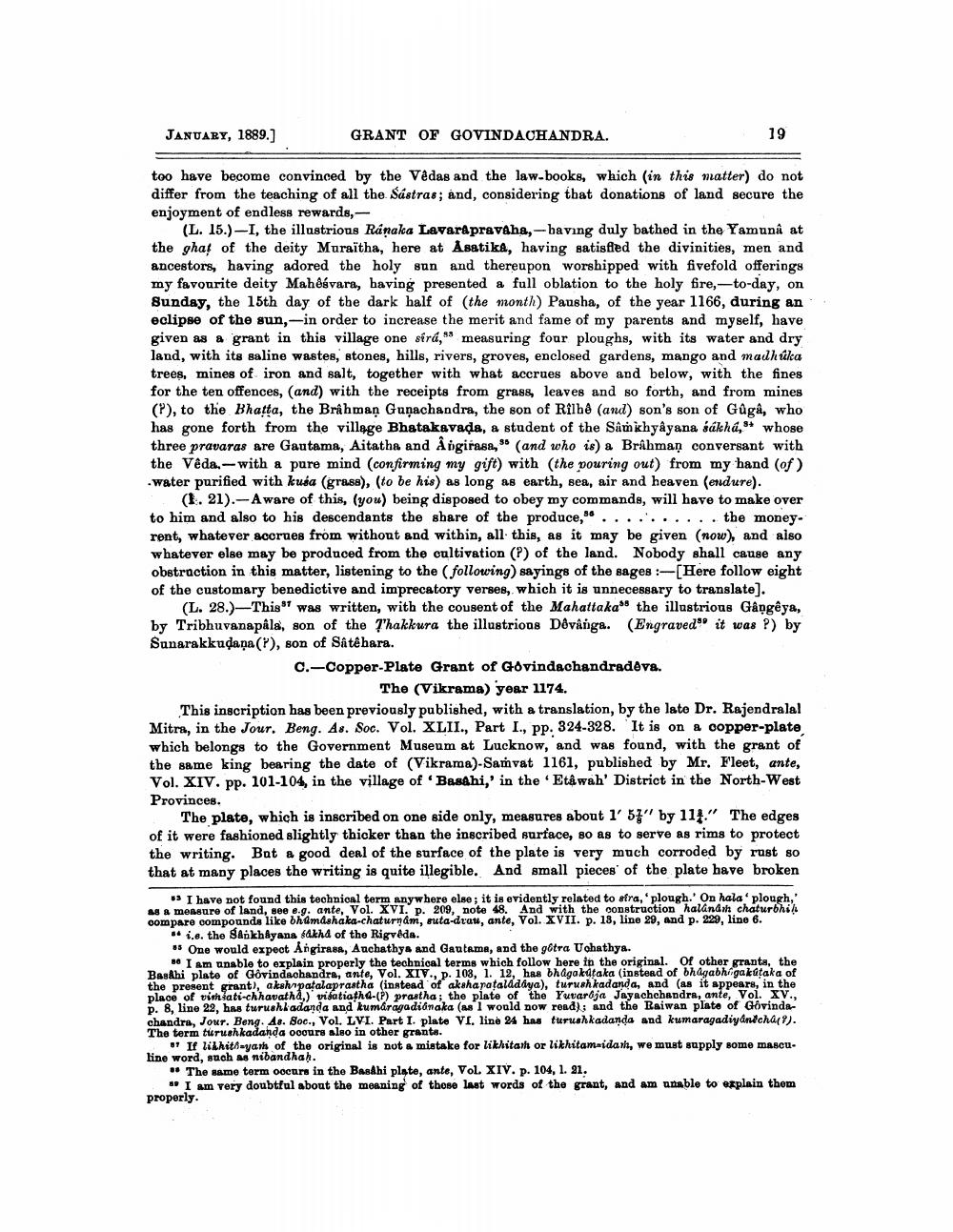________________
JANUARY, 1889.]
GRANT OF GOVINDACHANDRA.
19
too have become convinced by the Vedas and the law-books, which (in this matter) do not differ from the teaching of all the Sastras; and, considering that donations of land secure the enjoyment of endless rewards,
(L. 15.)-I, the illustrious Ránaka Lavarapravaha,--having duly bathed in the Yamuna at the ghat of the deity Muraïtha, here at Asatika, having satisfied the divinities, men and ancestors, having adored the holy sun and thereupon worshipped with fivefold offerings my favourite deity Mahêsvara, having presented a full oblation to the holy fire,-to-day, on Sunday, the 15th day of the dark half of the month) Pausha, of the year 1166, during an eclipse of the sun,-in order to increase the merit and fame of my parents and myself, have given as a grant in this village one sira,&* measuring four ploughs, with its water and dry land, with its saline wastes, stones, hills, rivers, groves, enclosed gardens, mango and madhika trees, mines of iron and salt, together with what accrues above and below, with the fines for the ten offences, (and) with the receipts from grass, leaves and so forth, and from mines (*), to the Bhatta, the Brahman Gunachandra, the son of Rilhê (and) son's son of Gúga, who has gone forth from the village Bhatakavada, a student of the Samkhyâyana sakha,S+ whose three pravaras are Gautama, Aitatha and Ångirasa, ** (and who is) a Brahman conversant with the Vêda.- with a pure mind confirming my gift) with the pouring out) from my hand (of) water purified with kuća (grass), (to be his) as long as earth, sea, air and heaven (endure).
(1.. 21).-Aware of this, (you) being disposed to obey my commands, will have to make over to him and also to his descendants the share of the produce, .......... the money. rent, whatever accrues from without and within, all this, as it may be given (now), and also whatever else may be produced from the cultivation () of the land. Nobody shall cause any obstraction in this matter, listening to the following) sayings of the sages :-[Here follow eight of the customary benedictive and imprecatory verses, which it is unnecessary to translate).
(L. 28.)-This was written, with the cousent of the Mahattaka® the illustrious Gângêya, by Tribhuvanapala, son of the l'hakkura the illustrious Dövånga. (Engraved it was P) by Sunarakkudaņa(*), son of Satê hara.
C.-Copper-Plate Grant of Govindachandradeva.
The (Vikrama) year 1174. This inscription has been previously published, with a translation, by the late Dr. Rajendralal Mitra, in the Jour. Beng. As. Soc. Vol. XLII., Part I., pp. 324-328. It is on a copper-plate which belongs to the Government Museum at Lucknow, and was found, with the grant of the same king bearing the date of (Vikrama)-Samvat 1161, published by Mr. Fleet, ante, Vol. XIV. pp. 101-104, in the village of 'Basehi,' in the 'Etawah' District in the North-West Provinces.
The plate, which is inscribed on one side only, measures about 1' 51" by 114." The edges of it were fashioned slightly thicker than the inscribed surface, so as to serve as rims to protect the writing. But a good deal of the surface of the plate is very much corroded by rust so that at many places the writing is quite illegible. And small pieces of the plate have broken
* I have not found this technioal term anywhere else; it is evidently related to sfra, 'plough.' On hala' plough, as a measure of land, see e.g. ante, Vol. XVI. p. 209, note 48. And with the construction halindh chaturbhil compare compounds like bhamashaka-chaturnam, ruta-draut, ante. Vol. XVII. p. 13, line 29, and p. 229. line 6.
** i.e. the Sankhayana sakha of the Rigveda. 85 One would expect Angirada. Auchathys and Gautama, and the g@tra Uchathya.
* I am unable to explain properly the technical terms which follow here in the original. Of other grants, the Basahi plate of Govindachandra, ante, Vol. XIV., p. 108, 1. 12, has bhagakdtaka (instead of bhagabhigakataka of the present grant), akshapatalaprastha (instead of akaharatalddaya), turush kadanda, and (as it appears, in the place of vitiati.chhavatha,) visatiath-(P) praatha; the plate of the Yuvarija Jayachchandra, ante, Vol. XV., p. 8, line 22, has turushkadanda and kumaragadianaka (as I would now read); and the Raiwan plate of Govindachandra, Jour. Beng. As. Soc., Vol. LVI. Part I. plate VI. line 24 has turushkadanda and kumaragadiyánécharp). The term turushkadanda occurs also in other grants.
" If lithith-yam of the original is not a mistake for likhitah or likhitamsidanh, we must supply some mascu. line word, such as nibandha).
"The same term oocars in the Basahi plate, ante, Vol. XIV. p. 104, 1. 21.
# I am very doubtful about the meaning of those last words of the grant, and am unable to explain them properly.




